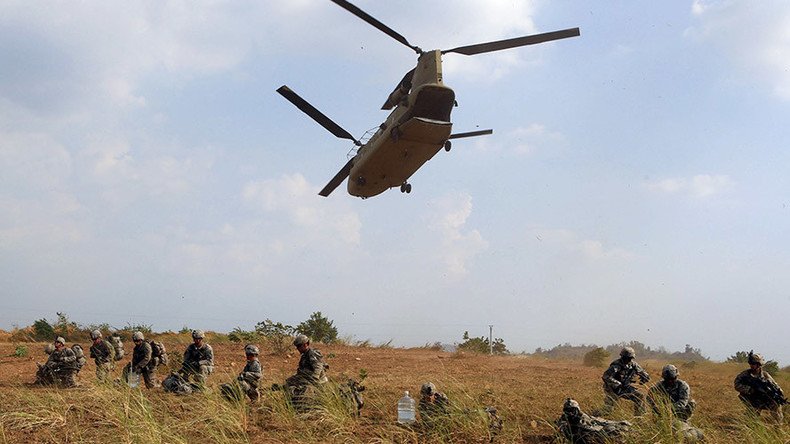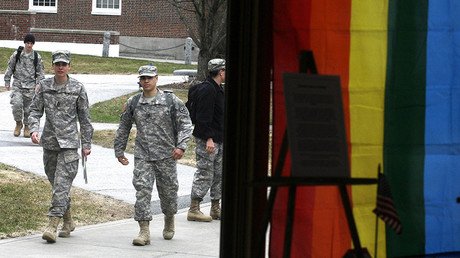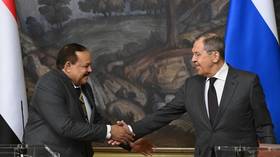Military draft for women among dropped ideas in compromise 2017 defense bill

Congress has managed to finalize a $618.7 billion defense bill for the 2017 fiscal year, boosting it with an extra $3.2 billion for manpower, while stripping extra ships and jets. Requirements for women to register for the draft are also gone from the bill.
After months of negotiations, both legislative chambers have reached an accord on the new National Defense Authorization Act (NDAA), which is set to come to a final floor vote in the House this week and in the Senate next week.
Senior staffers from the House and Senate Armed Services committees have unveiled details of the bill on Tuesday, at an off-camera background briefing.
The compromised version of the NDAA would authorize a total of $618.7 billion in defense spending for the 2017 fiscal year. Of that, $59.5 billion would be earmarked for the so-called Overseas Contingency Operations (OCO), a budget that exceeds the president’s request by $3.2 billion. Part of the OCO account – $8.3 billion – would be used for base budget requirements, including troop increases, while President Barack Obama requested $5.1 billion.
There are concerns that such voluntary add-ons may again be an issue for Democrats, which want all defense hikes to be matched by increases in domestic budget programs.
“There’s still an issue that that $3.2 billion… does not have a match on the domestic side, so it brings the same parity issue,” a senior staffer has suggested, according to both Defense News and the Hill.
Under the compromise NDAA, most of the US military services would have an increase in manpower. Thus, in 2017, the army’s end-strength would reach 476,000, with 1,000 extra troops compared to this year. The Marine Corps will have 185,000 soldiers, with an additional 3,000 people, and the Air Force would have 321,000 servicemen with an increase of 4,000. The Navy would remain at 323,900 troops.
At the same time, the conference report eliminates a number of provisions, such as, for example, extra 14 F/A-18E/F Super Hornets aircraft for the Navy or 11 more F-35 joint strike fighters across all branches.
MORE: #Gitmo transfer bill vote largely along party lines, w/ 4 Republicans opposing, 12 Dems in favor https://t.co/Ii2Vpv6IYx
— RT America (@RT_America) September 15, 2016
Also not covered are AH-64 Apache helicopters and other major weapons systems over what Obama’s budget request originally proposed in February. In its version, the House Armed Services Committee (HASC) proposed to increase spending for additional aircraft and add $20.6 billion to the Navy’s shipbuilding budget, which marked a $2 billion plus-up.
“Once you lose the end strength it’s a minimum of three years to get back to it,” an aide said, according to the US Naval Institute News. “On the procurement side, you get another bite; you can always try to get [ships and planes] in when we actually do the final budget next year after we get through the [continuing resolution], there’s another bite at the apple available… There’s another day to fight on the procurement side, but once you let the end strength go it takes years to build it back.”
The bicameral NDAA also excluded a provision that would have required women to register for the draft.
Neither will there be a provision known as the Russell Amendment, named for Representative Steve Russell (R-Oklahoma) who introduced it. The Russell Amendment stated that federal contractors couldn’t be discriminated against based on their religion. In October, 42 Democratic senators urged the House and Senate Armed Services Committees to remove the section, arguing that it would “vastly expand religious-affiliated organizations receiving federal funds to engage in discriminatory hiring practices.”
“The Russell Amendment was in response to the executive orders. The NDAA was always an imperfect remedy for that problem,” one staffer said, according to the Hill. He believes Donald Trump’s election may bring a change. “Subsequent to the election, a new path has opened to address those issues. It’s still a very important issue for the members, and they intend to pursue those other paths.”
According to the Hill, restrictions related to the Guantanamo Bay US detention facility in Cuba would remain unchanged in 2017.
On Tuesday, Defense Secretary Ash Carter urged legislators to pass the Defense Department’s budget as quickly as possible, saying he was concerned over possible extension of the continuing resolution into May 2017.
“A short-term CR is bad enough, but a CR through May means DoD would have to operate under its constraints for two-thirds of the fiscal year. This is unprecedented and unacceptable, especially when we have so many troops operating in harm's way. I strongly urge Congress to reject this approach,” Pentagon spokesman Peter Cook said, citing Carter’s memo to the Congress.














